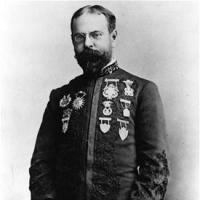John Philip Sousa

John Philip Sousa (November 6, 1854 - March 6, 1932), is probably the most famous marching band conductor (although his band rarely marched) and composer in history. He wrote well over 100 marches; some of his most popular are:
" Semper Fidelis (1888)
" The Washington Post March (1889)
" The Thunderer (1889)
" The Liberty Bell (1893)
" Manhattan Beach March (1893)
" King Cotton (1895)
" The Stars and Stripes Forever (1896)
" El Capitan (1896)
" Hands Across the Sea (1899)
" Fairest of the Fair (1908)
" U.S. Field Artillery (1917)
" The Gallant Seventh (1922)
" The Black Horse Troop (1924)
" Daughters of Texas (1929)
The marching brass bass, or sousaphone, is named after him.
Sousa's musical education began when he was seven years old. At the age of 13, he was enrolled as an apprentice with the United States Marine Corps Band. He left it after several years to join a theatrical band. He soon began conducting, and returned to the Marine Band as its head in 1880. During this time Sousa also led the marching band of Gonzaga College High School.
Sousa organized his own band in 1892. It toured widely, and in 1900 represented the United States at the Paris Exposition before touring Europe. Sousa repeatedly refused to conduct on the radio, fearing the lack of personal contact with the audience; he was persuaded to do so in 1929, and was very successful.
In addition to hundreds of marches, Sousa wrote ten operas and a number of musical suites.
Sousa exhibited many talents aside from music. He authored three novels and a full length autobiography as well as a great number of articles and letters-to-the-editor on a variety of subjects. As a trapshooter, he ranks as one of the all-time greats and his skill as a horseman met championship criteria.
He was in the vanguard of the reactionary camp in the music piracy wars of his era (cf. Recording Industry Association of America), in which authors of sheet music railed against the upstart recording industry. In a submission to a congressional hearing in 1906, he argued that:
These talking machines are going to ruin the artistic development of music in this country. When I was a boy ... in front of every house in the summer evenings, you would find young people together singing the songs of the day or old songs. Today you hear these infernal machines going night and day. We will not have a vocal cord left. The vocal cord will be eliminated by a process of evolution, as was the tail of man when he came from the ape.
The Operettas
" The Queen of Hearts, 1885, also known as Royalty and Roguery.
" The Smugglers, 1882.
" Desiree, 1883.
" El Capitan, 1895.
" The Bride Elect, 1897, libretto by Sousa.
" The Charlatan, 1898, also known as The Mystical Miss, lyrics by Sousa.
" Chris and the Wonderful Lamp, 1899.
" The Free Lance, 1905.
" The American Maid, 1909, also known as The Glass Blowers.
Sousa also composed the music for six operettas that were either unfinished or not produced: THE DEVIL'S DEPUTY, FLORINE, THE IRISH DRAGOON, KATHERINE, THE VICTORY, and THE WOLF.
Sousa the Freemason
One year after the 1882 transit of Venus, Sousa was commissioned to compose a processional for the unveiling of a bronze statue of American physicist Prof. Joseph Henry, who had died in 1878. Henry, who had developed the first electric motor, was also the first secretary of the Smithsonian Institution in Washington, D.C.
A Freemason, Sousa was fascinated by what the group considered mystical qualities in otherwise natural phenomena. According to Sten Odenwald of the NASA IMAGE Science Center[1] (http://image.gsfc.nasa.gov/poetry/venus/TransitFAQs.html), this played a significant role in the selection of the time and date of the performance, April 19, 1883, at 4:00 P.M. Dr. Odenwald points out that Venus and Mars, invisible to the participants, were setting in the west. At the same time, the Moon, Uranus and Virgo were rising in the east, Saturn had crossed the meridian, and Jupiter was directly overhead. According to Masonic lore, Venus was associated with the element copper, and Joseph Henry had used large quantities of copper to build his electric motors.
The "Transit of Venus March" never caught on, and went unplayed for more than 100 years, after Sousa's copies of the music were destroyed in a flood. As reported in The Washington Post, Library of Congress employee Loras Schissel recently found copies of the old sheet music for VENUS languishing in the library's files. The piece was resurrected recently, in time for the 2004 Transit.
From Wikipedia, the free Encyclopedia.





